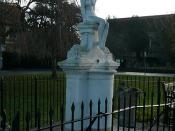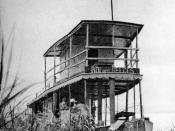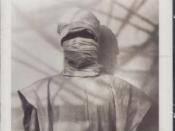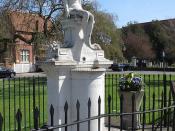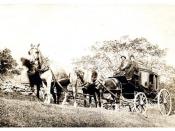As a writer, Joseph Conrad struggles with the difficulty of story telling and the perilous task of trying to 'make them understand'. This debate finds its way into many of Conrad's novels and is intrinsically tied to one of his most famous works, Heart of Darkness. The problems of story telling lie both in the narrator and with in the nature of language itself, but as well, it is these two components that allow Conrad to develop many thematic issues throughout the novel. Due to the very nature of narration, issues such as motivation, credibility and influence need to be examined. As well, the use of language itself can be problematic. There is the difficulty of the ambiguities of meaning and problems of a bodiless voice and thus Conrad is in search for the perfect form of written expression. Conrad uses these uncertainties to bring his themes to the forefront of Heart of Darkness such as the importance of the work ethic and restraint as well as the darkness he saw brewing in Europe and the difficulties surrounding current forms of communication.
Heart of Darkness is a story, with in a story, with in a story. There is an unnamed, unidentified frame narrator. He is a former sailor who is now part of a group of professionals sitting on a yacht in the mouth of the Thames. He is retelling the story he is hearing from Charlie Marlow, another passenger, and ex-seaman, on the yacht. Marlow explains what happened to him years before when he piloted a steamboat up a river in Africa to locate an agent named Kurtz for a Belgian company involved in ivory trade. As Marlow purges into the jungle he begins to question all that he thought was true and real. He believes that if he can find Kurtz then he will find the answers to his questions and doubts. He was "curious to see whether this man, who had come out equipped with moral ideas of some sort, would climb to the top after all and how he would set about his work when there" (HOD 58). Marlow reaches Kurtz but instead of secrets all he finds is darkness. In the end Kurtz has succumbed to his surroundings and Marlow grapples with Kurtz's demise and the "horror" he has seen (HOD 97).
In order to save himself, Marlow is given a trait that everyone else lacks, restraint. "Mr. Kurtz lacked restraint in the gratification of his various lusts" and because of this he was not able to survive (HOD 86). It is Marlow's disciplined work ethic that allows him to be a narrator and a survivor (De Mile 94). Marlow explains to his listeners, "You wonder I didn't go ashore for a howl and a dance? Well, no - I didn't . . . I had no time" (HOD 64). By concentrating on his work and the surface of things, Marlow is able to avoid the impulses and the horrible realities of the Congo. "When you have to attend to things of that sort, to the mere incidents of the surface, the reality - the reality - the reality, I tell you - fades. The inner truth is hidden - luckily, luckily" (HOD 62). Now that he has survived the experience, Marlow is forced to face it and he does this through narration.
For Marlow the act of narration is motivated by a strong need for ordering and linguistically structuring distance from his experiences in the Congo, while paradoxically actualizing his experience there (Lothe 39). Narration allows for self-preservation and protection. It creates a shield by moving attention away from a threatening primary experience to retelling the story, and at the same time it also helps the narrator to better understand the incidence. Like a dream we are able to tell another person about our vivid experience but they cannot know what it was like to truly be there. "We live as we dream - alone . . ." (HOD 55). Although no one can relive what has been experienced, communication makes it possible to gain a knowledge and understanding, which often can be even greater than the experience itself. This communication also benefits the dreamer, as only through discussion can they truly understand what has happened and the meaning behind it. Thus the listener and the dreamer come to realize the actuality and impact of the experience, even if at different levels. For Marlow, the act of narration allows him to come to a realization that enables him to survive and also preserve Kurtz's memory.
Narration both explains and evades what lies beneath in terms of ones own reality; therefore, how one perceives the situation to have been and how it has shaped their life since then will greatly effect how they retell the story. And in Marlow's case, where he said that the circumstances "seemed somehow to throw a kind of light on everything about me," it can be even more troublesome to see the facts clearly (HOD 35). This framing brings to question a problem of narration, how accurate is memory and thus calls into question narrative credibility. "The mind of man is capable of anything - because everything is in it, all the past as well as the future" (HOD 64). Conrad realizes the power that a story has over its narrator but he also acknowledges the power that the narrator has over the story they retell. And although the frame narrator is a helpless spectator to Marlow's story he also holds power over the story he tells the helpless reader. The narrator has absolute and seemingly blind control, to omit or add facts and also to judge and learn, which has the ability to affect the reader's opinion. Through careful planning Conrad uses the frame narrator for both of these purposes. The frame narrator becomes deeply important as he helps verify Marlow's story and as well, open the reader's eyes to Marlow's messages.
The frame narrator contrasts the initial skepticism the reader may have for the internal narrator, Marlow. The frame narrator acts as a liaison between Marlow's bizarre adventure in the Congo and the reader's life in turn of the century England. He gives Marlow's story vividness through his seemingly respectable and socially 'normal' position. Conrad, like Marlow, is telling a story which he realizes most listeners will not understand. They realize that these listeners's are difficult to reach as they are "each moored with two good addresses . . . a butcher round one corner and a policeman round another" (HOD 54). They live in a nice civilized world where one man kills their food and another solves their problems. This allows them to feel isolated from their follies and separated from the realities of imperial in Africa. By having this respectable frame narrator it brings the readers out of Marlow's Congo and into their own space. At this point they are able to find meanings in their own surroundings which are not normally obvious but which the story helps illuminate.
As the frame narrator brings Marlow's story to the reader, he has certain degrees of power over the way they feel and think about the tale. The way Marlow is introduced by the frame narrator intrigues the reader but also makes them skeptical about who this person is and why they are telling the story. In the beginning the narrator assesses that "Marlow was not typical" he "did not represent his class. He was a seaman, but he was a wonderer too . . ." (HOD 33). The reader prepares for Marlow's tale uneasily as the frame narrator continues. He discourages the forthcoming story with an unwritten sigh and a warning that "we were fated, before the ebb began to run, to hear about one of Marlow's inconclusive experiences." (HOD 35) As the frame narrator justifies the reader's doubtfulness he forms an alliance with them, which allows him to continue to effect their thoughts throughout the novel.
At the beginning of Heart of Darkness, the frame narrator is ignorant listener but as the story progresses, he, like Conrad's readers, becomes more educated and insightful. This progress increases his significance as he points to thematic issues and messages and what takes place is what Ian Watts calls 'delayed decoding' (Lothe 30). Delayed decoding allows Conrad to present an impression or image through Marlow, and then later explore and discover its meaning with the frame narrator. This is important as the symbolism in Heart of Darkness often lags behind the narrative development of Marlow's story and thus cannot be fully appreciated until the text is complete. For example, at the beginning of the novel Marlow abruptly says, "And this also . . . has been one of the dark places of the earth" (HOD 33). The frame narrator brushed off the remark because it "did not seem at all surprising. It was just like Marlow. It was accepted in silence" (HOD 33). By the end of the novel, the frame narrator has been affected by the story, unlike the other passengers, and he now understands the importance of Marlow's tale. He sees how the Thames is a "tranquil waterway leading to the uttermost ends of the earth flowed somber under an overcast sky - [which] seemed to lead into the heart of immense darkness" (HOD 105). The reader, through the narrator, finally discovers that the Thames, and Western Europe overall, is still a dark place and needs to be heeded. Although the frame narrator does not learn as much from Marlow's story as it seems Marlow himself does, he is able to build an important level of insight, which helps the reader also begin to understand the unexplainable.
Language, and the very nature of language, also creates difficulties for a storyteller. Words have the ability to both build and betray and Conrad worries about the possibilities of accurate verbal communication. In Conrad's first letter to Graham Cunninghame he says, "one writes only half the book; the other half is with the reader" (Hawthorn 15). It is not enough to write a good story the reader must first read it and then understand its messages and Conrad struggles with how best to do this. On top of the ambiguities of language Conrad also struggles with problems of disembodied communication and how meanings can easily become lost in such a form. Over and over again he wonders how he can just 'make them understand.' Conrad, like his characters, is searching for the perfect way to express his thoughts. Words have the ability to rise above circumstances, which gives them both their power and their vulnerability (Hawthorn 35). Marlow says that his experience is inexpressible as "it is impossible to convey the life-sensation of any given epoch of one's existence - that which makes its truth, its meaning - its subtle and penetrating essence. It is impossible" (HOD 55). In Heart of Darkness there are two examples of literature, first, a book called An Inquiry into some Points of Seamanship and second, "Suppression of Savage Customs", or as Marlow refers to it, Kurtz's piece of "beautiful writing" (HOD 78). As Conrad is exploring the most effective way of writing to get a message across Marlow reads both of these pieces and compares the differing styles for the reader.
In the first piece of work Marlow examines its concrete and direct language, and although it may get the message across he states that it appears to be "dreary reading" (HOD 65). "Not a very enthralling book; but at the first glance you could see there a singleness of intention, an honest concern for the right way of going to work, which made these humble pages, thought out so many years ago, luminous with another than a professional light" (HOD 65). This writing again comes back to one of the main themes in Heart of Darkness, the importance of a good work ethic and restraint. Like the Points of Seamanship, Conrad believes that all professionals, writers included, are in need of restraint in a lawless world, such as that of the imagination. And those who lose their restraint, as Kurtz does in the savage Congo, will lose themselves and possibly the message of their work.
In the second piece of writing Kurtz is searching for exactly the right words to express ideas that he knows most people cannot begin to understand. After reading Kurtz's work Marlow comments that, "The peroration was magnificent, though difficult to remember . . . It gave me the notion of an exotic Immensity ruled by an august Benevolence. It made me tingle with enthusiasm. This was the unbounded power of eloquence - of words - of burning noble words. There were no practical hints to interrupt the magic . . ." (HOD 78). The question then becomes how does one best express himself, especially to people who likely will not understand. Is it best to be prescriptive at the risk of being boring; or is it better to utilize the power of beautiful and enthralling words to make them see and feel, at the risk of losing the message. Conrad wants to do more than convey a life like sensation; he wants to give an episode meaning. He is able to accomplish both tasks in Heart of Darkness through the use of Marlow's brilliant images and the frame narrator's explanatory account and learning process.
Talking to a foreign body becomes the second difficulty of language that Conrad faces. From the pitch darkness of the Congo, to the dark Nellie, the only thing left is a voice. Marlow emerges as a character similar to Coleridge's 'Ancient Mariner;' he is a "voice . . . that cannot be silenced" (HOD 64). This becomes difficult for Marlow as a storyteller, as he is detached from the recipient. The problems of communication in Heart of Darkness mirror the communication problems in Conrad's own society. Messages have become "no more than a voice" (HOD 45). And everyone has become disembodied parts," naked breasts, arms, legs, glaring eyes" (HOD 73). Conrad was worried about the effectiveness of such distant forms of communication because when "you don't talk with that man - you listen to him" something gets lost in the lack of exchange (HOD 81). In Heart of Darkness, Conrad's voice is bodiless to his readers, as is the anonymous frame narrator, and similarly Marlow is only a voice to the other men aboard the dark ship, and for Marlow, Kurtz also becomes no more than a bodiless voice. Since these people are reduced to only their speech for communication Conrad questions whether or not their listeners are getting the right messages, and if not is there a better way to explain it? But since there are no fatal results from reading a novel: "Heavens to do not fall for such a trifle" it is hard to see if a mistake has been made and thus the message is gone unheard (HOD 105). Conrad explores to these problems in Heart of Darkness and attempts to find a solution. Through the linguistic filtering of the story itself, he encourages an exchange of ideas that attempts to convey Marlow's and Kurtz's thoughts and which strives to solve the difficulties of such bodiless communication.
As we have seen narration can explain, purge and protect, and Conrad uses it for all these purposes in Heart of Darkness. Narration is such a pivotal aspect in this novel that both the narrator and the audience become so involved with storytelling that it reveals many of Conrad's messages. In one instance it is imperialism as professionalism and thus the importance of the work ethic emerges. Through the act of story telling Marlow is able to save himself and look deeper to find meaning in this experience. For Conrad, the 'heart of darkness' became what we now know as World War One, and through his narrative levels he attempts to open his readers eyes to the realities of the world around them. Conrad's narrative structure also helps him solve some of the linguistic problems he faces. The nature of language itself can be difficult to overcome as it can both explain and evade. Conrad looks at prescriptive and descriptive writing and attempts to combine the two in order to help the reader better understand what Marlow thinks is 'unexplainable'. But even if this combination of writing works, Conrad acknowledges that writing, like other forms of communication in his society, is only a voice and that with the emphasis on only one part of the body the message of the entire self can be lost. Again his narration style attempts to solve this dilemma. It acts as an idea exchange rather than as a disembodied narrative novel. For Conrad, the most frustrating aspect of trying to 'make them understand' is that there is no way of ever knowing for sure if one has been successful. Although Conrad continually attempts to develop the 'perfect' literary form, he continues to worry about possibilities of accurate verbal communication and how that relates to his skills as a writer and the usefulness of writing fiction overall.
Bibliography Conrad, Joseph. Heart of Darkness and Other Stories. Herfordshire, England: Wordsworth Editions Limited 1995.
De Mille, Barbara. "An Inquiry into some points of Seamanship: Narration as Preservation in Heart of Darkness" Concordian (Nov.1986): 94-104.
Hawthorn, Jeremy. Joseph Conrad: Narrative Technique and Ideological Commitment. Nebraska, United States: University of Nebraska Press, 1979.
Lothe, Jakob. Conrad's Narrative Method. Oxford, England: Clarendon Press, 1989.
White, Andrea. "MLA Responses to Panel on 'Theorizing Conrad's Fiction.'" California, United States: California State University, 1998.
